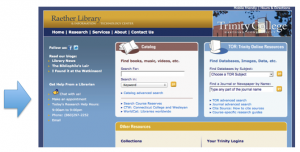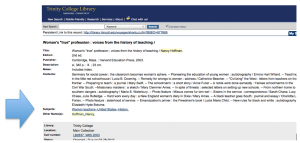Question: In her 2003 book, historian Nancy Hoffman published letters written by nineteenth-century teachers such as Ellen Lee and Mary Adams, which were located in an archive. How can you find similar letters (or diaries) written by other teachers from this era? Describe your search strategy (but obtaining the actual letters is not required).
Option One (requires prior knowledge)
This particular source detective work, to explain how to find actual letters or diaries written by nineteenth century school teachers, lead me first to Google. The original source provided by Jack, Woman’s “true” profession : voices from the history of teaching by Nancy Hoffman, cited in the chapter heading, that the letters were from a collection at the Connecticut Historical Society. In the Cities Suburbs and Schools seminar I learned about the Connecticut Historical Society and was taught that they did have an online presence, as well as some material available on line.
1. Open your computer, then an Internet browser of your choice, and type in www.google.com into the address bar at the top of the screen.
2. When the google window appears, in the large search bar provided, type “Connecticut Historical Society”.
3. The search will produce many findings, the second option was what I was looking for. I was aware the museum was located in Hartford and the address to the right of the website title alerted me that this was indeed the Hartford Historical Society of Hartford, Connecticut. (Reason number 724,356 to LOVE Google.)
4. After selecting the second option I was able to see the website for the Connecticut Historical Society.
5. On the top of the page there is a menu bar, click on the one titled “Research”. Then click on the link “online database and subject databases” and search “National Board of Popular Education Collection”.
6. Only one option was returned in the search and it was indeed a letter! The summary description of the source explains that this is exactly what I am looking for. It was not available to view online so I will need to go the library to view it. You can use Google Maps for driving or walking directions to the Connecticut Historical Society.
Option Two (Assumes comfort with navigating the internet and access to Trinity College databases.)
Ask a Librarian
As students at Trinity College we are fortunate to have easy access to librarians. The first step is to make an appointment with them. Here.

2. I selected the librarian I wanted to work with, and then a time I he and I were both available. Finally, I pasted the assignment instructions into the question box that asks “What is your research topic?” and I was all set. I received an email confirmation of the appointed that was easy to insert into my Google Calender.
3. My appointment was with Rob Walsh, and he also believed starting with Nancy Hoffman’s book was a good idea. We searched for it in the library catalouge using the advanced search option.
4. Rob informed me that the subjects listed underneath the comments section of the book are actually in all the libraries. Meaning that libraries categorize all their holdings of specific subjects in the same way.

5. Rob insisted using the specific vernacular of the library subject to search World Cat. “WorldCat is the world’s largest network of library content and services. WorldCat libraries are dedicated to providing access to their resources on the Web, where most people start their search for information” (WorldCat website).
6. When we search “Women teachers–United States–History”, our search produced thousands of results, but more importantly many were a part of Trinity’s collection. The first book listed, Women Teachers on the Frontier by Polly Welts Kaufman is described as, “collected reminiscences tell the story of the single women who travelled to the West as teachers before the Civil War.” This is what I was looking for!
7. In the spirit of Rob’s “serendipitous finding” I went to the call number of the book and found a shelf of texts related to the subject.
Option Three (Unexplored)
Trinity College does have a database of primary source documents, oral historys, and videos etc. I did not utilize this data base because I felt that I had enough to start with. The database can be found here.